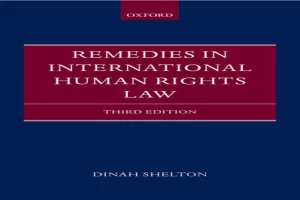Newly released
This book is new and will be uploaded as soon as it becomes available to us and if we secure the necessary publishing rights.

Remedies in international human rights law Book PDF
(0)
Author:
Dinah SheltonNumber Of Reads:
70
Language:
English
Category:
Social sciencesSection:
Pages:
513
Quality:
good
Views:
1318
Quate
Review
Save
Share
New
Book Description
The fully revised and updated Third Edition of 'Remedies in International Human Rights Law' provides a comprehensive analysis of the law governing international and domestic remedies for human rights violations. It reviews and examines the texts and the jurisprudence on this key area of human rights law. It is an essential practical and theoretical resource for policymakers, scholars, and students negotiating and litigating issues of redress for victims. The Third Edition incorporates the major developments in remedial human rights jurisprudence. Internationally, the United Nations and the International Criminal Court have issued reparations guidelines; the International Court of Justice has for the first time awarded compensation for human rights violations; the International Law Commission has considered the humanitarian responsibility of international organizations; and new international petition procedures and policies on redress have entered into force. Regionally, in Asia and Africa, human rights bodies have adopted new human rights accords and legal judgments; in Europe, the human rights case load unceasingly increases.0Nationally, the jurisprudence of historical reparations has come to the fore, as has the juridical consideration of economic and social rights. All of these developments are analysed in context and create a comprehensive and accessible portrait of the state of remedial human rights law today. Read more...
Abstract: This fully revised and updated edition comprehensively analyses the international and domestic remedies available for human rights violations and examines the jurisprudence on these violations. It is an essential practical and theoretical resource for policymakers, scholars, and students negotiating the developments in remedial human rights law.
Dinah Shelton
Dinah L. Shelton joined the law school faculty in 2004. Before her appointment, she was professor of international law and director of the doctoral program in international human rights law at the University of Notre Dame Law School from 1996-2004. She previously taught at Santa Clara University and was a visiting lecturer at the University of California, Davis, Stanford University, University of California, Berkeley, the University of Paris, and the University of Strasbourg, France. From 1987 to 1989, she was the director of the Office of Staff Attorneys at the U.S. Court of Appeals for the Ninth Circuit.
Professor Shelton is the author or editor of three prize-winning books: Protecting Human Rights in the Americas (winner of the 1982 Inter-American Bar Association Book Prize and co-authored with Thomas Buergenthal); Remedies in International Human Rights Law (awarded the 2000 Certificate of Merit, American Society of International Law); and the three volume Encyclopedia of Genocide and Crimes against Humanity (awarded a “Best Research” book award by the New York Public Library). She also has authored many articles and books on international law, human rights law, and international environmental law. She is a member of the board of editors of the American Journal of International Law and is a vice-president of the American Society of International Law.
Professor Shelton serves on the boards of many human rights and environmental organizations. In 2006, she was awarded the prestigious Elizabeth Haub Prize in Environmental Law, and has served as a legal consultant to the United Nations Environment Programme, UNITAR, World Health Organization, European Union, Council of Europe, and Organization of American States. In 2009, she became the first woman nominated by the United States to become a member of the Inter-American Commission on Human Rights, established by the Organization of American States to promote and protect human rights in the Western Hemisphere. She served a four-year term, during which she went on to become President of the Commission.
Read More
Book Currently Unavailable
This book is currently unavailable for publication. We obtained it under a Creative Commons license, but the author or publisher has not granted permission to publish it.
Rate Now
5 Stars
4 Stars
3 Stars
2 Stars
1 Stars
Remedies in international human rights law Quotes
Top Rated
Latest
Quate
Be the first to leave a quote and earn 10 points
instead of 3
Comments
Be the first to leave a comment and earn 5 points
instead of 3